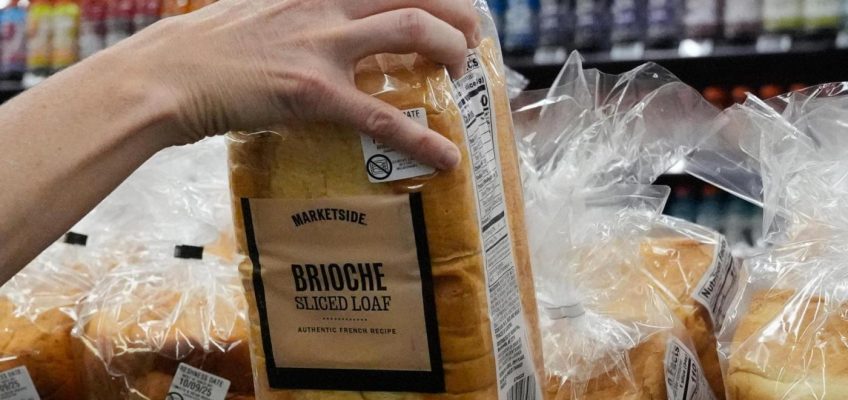By ANNE D’INNOCENZIO and JONEL ALECCIA, Associated Press
NEW YORK (AP) — Walmart said Wednesday that it plans to remove synthetic food dyes and 30 other ingredients, including some preservatives, artificial sweeteners and fat substitutes, from its store brands sold in the United States by January 2027.
The move announced by the the nation’s largest retailer amounts to an acknowledgment that American consumers and the U.S. government under President Donald Trump are paying attention to what goes into packaged foods. Walmart said its goal would affect about 1,000 products, including salty snacks, baked goods, power drinks, salad dressings and frosting.
A customer walks past a display of Great Value brand cereal at a Walmart Neighborhood Market, Friday, Sept. 26, 2025, in Bentonville, Ark. (AP Photo/Charlie Riedel)
Several of the ingredients on Walmart’s removal list, however, already are banned, not widely used or have not been used in the U.S. food supply for decades. Others were included despite no known problems or have been targeted by the Trump administration for review and possible elimination as an approved food additive, according to food safety experts.
Walmart said the 14-month reformulation plan primarily would involve its largest private-label food brand, Great Value. Customers also can expect changes in Walmart’s Marketside and Freshness Guaranteed lines of prepared foods, and to some extent in its premium label Bettergoods products, the company said.
In recent months, major food companies such as Kraft Heinz, Nestle and Conagra Brands have pledged to eliminate petroleum-based synthetic dyes in coming years. Walmart took its news a step further by identifying other kinds of food additives in its phase-out timeline.
The chemicals and compounds the discount retailer intends to eliminate encompasses the breadth of food manufacturing. For example, Walmart’s list includes potassium nitrate, potassium nitrite and potassium bisulfite, which are used as preservatives in processed meats. It also plans to remove phthalates, a chemical used to make plastic flexible.
Health advocates have argued that phthalates in plastic wrap, plastic packaging and plastic bottles can end up in food and beverages. The U.S. Food and Drug Administration has limited but not ended their use in items that come into contact with food.
But some of the 30 non-dyes listed by Walmart are already banned or no longer used. Simplesse, a fat substitute the company named, was phased out of the U.S. food market in 2023. Other banned additives on the list include synthetic trans fatty acids, or trans fats, which the FDA effectively phased out and then eliminated in 2023 by determining that partially hydrogenated oils no longer were recognized as safe.
Related Articles
‘AI actor’ Tilly Norwood stirs outrage in Hollywood
FTC sues Zillow and Redfin over deal it accuses of supressing competition in rental ads
OpenAI’s ChatGPT now lets users buy from Etsy, Shopify in push for chatbot shopping
California police pull over a self-driving Waymo for an illegal U-turn, but they can’t ticket
St. Paul: Hearing on Midway CVS draws fresh calls for demolition
Walmart said the choice of banished additives reflected the availability of “viable and scalable alternatives” for maintaining product quality, taste and affordable pricing.
Some of the 11 artificial food dyes the company identified, such as Red No. 4, Red No. 3, Citrus Red No. 2 and Orange B, also are already banned or the subject or proposed bans, or haven’t been used in the U.S. for years.
In June, Walmart’s wholesale club division, Sam’s Club, said it would remove more than 40 ingredients, including artificial colors and the artificial sweetener aspartame, from its Member’s Mark products by the end of the year.
Walmart shoppers also are likely to see reformulated food items in the coming months, the company said. Among them: Great Value cheese dips made with paprika and annatto, a food coloring and spice that’s derived from the seeds of the achiote tree, in place of Yellow No. 5 and Yellow No. 6, Walmart said.
In the future, a new version of Great Value Fruit Spins Cereal will not get its colors from Red No. 40, Yellow No. 6 and Blue No. 2, but from beta carotene, annatto, blue-green spirulina and juice concentrates, according to Walmart.
Scott Morris, Walmart’s senior vice president of private brands food, consumables, and manufacturing, told The Associated Press that 90% of Walmart’s private label foods don’t contain synthetic dyes. He said Wednesday’s news marks the biggest food reformulation in Walmart’s history but also an acceleration of a process the company initiated in the last few years.
Customers have been asking Walmart to get rid of certain ingredients, but replacing them with more natural alternatives is complicated, Morris said. The performance of the substitutes can vary significantly depending on whether a product is shelf stable or needs to be refrigerated, he said. New versions need to be vigorously taste-tested with customers, he added.
“Every item’s a snowflake,” Morris said.
The main factor that prevented Walmart from overhauling its food shelves sooner was a limited availability of approved alternatives, but the market for those is increasing, he said.
“Now’s the right time to make our declaration and be more broad with our application of the natural ingredients,” Morris said.
The federal government is also giving artificial food dyes increased scrutiny,
Days before Trump returned to office, the FDA banned the dye called Red 3 from the nation’s food supply, nearly 35 years after it was barred from cosmetics because of potential cancer risk.
In April, Health Secretary Robert F. Kennedy Jr. and FDA Commissioner Marty Makary said the agency would take steps to eliminate synthetic dyes by the end of 2026, largely by relying on voluntary efforts from the food industry.
Aleccia reported from Southern California.


Leave a Reply